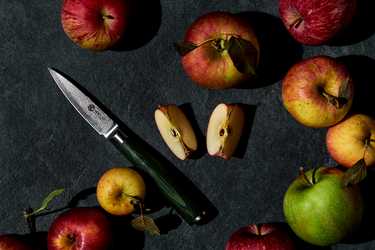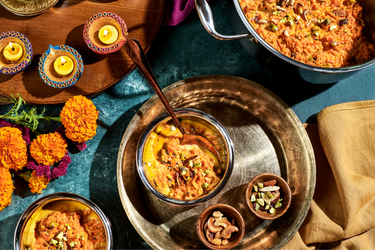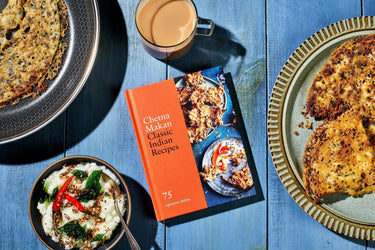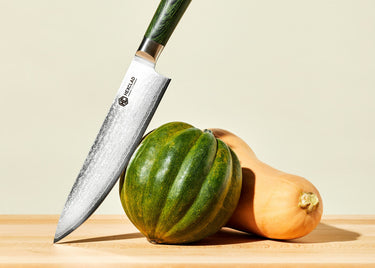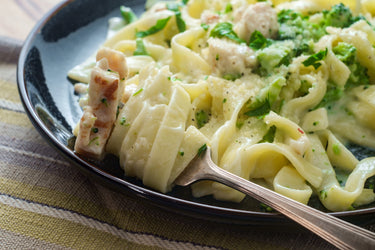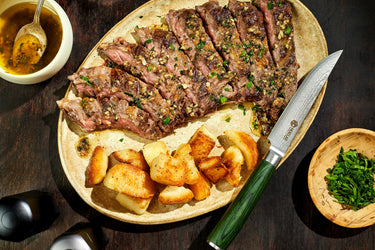The Best Cookware for Gas Stoves: What To Look For
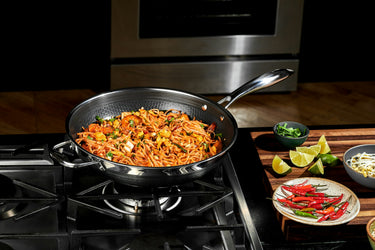
When it comes to the kitchen, a cook’s cooking range can be a very personal feature. There are a lot of different preferences, from burners to heat sources. But if you’re reading this, you’ve obviously gone for the tried and true gas stove.
Gas is a versatile heat source that works well with many cooking methods. However, when it comes to cookware for your gas stove, certain materials will work better than others.
Different types of pots and pans react differently with gas heating. But with the right kitchen equipment, you can skillfully perform different techniques with Gordon Ramsay-quality
results.
We’ll break down what you can do with a gas stove, what to look out for, and how to choose the right pots and pans to fit your specific needs.
What’s Different About Cooking With Gas?
With a gas stove, you turn the dial to light the burner. The stove emits a combination of oxygen and natural gas such as propane or butane. A signal sends out an igniter or spark that lights the fuel, which then creates a physical flame to cook over.
Once lit, you can easily adjust the cooking heat to higher or lower. This is one of the major benefits of gas stoves. Other stoves like electric stoves take more time to cool down or heat up.
You can cook with just about any type of cookware on a gas stove. However, you want to be sure that the products are tough and high-quality so that you can get the most out of your recipes.
Today, we’re sorting through the muck to see what cookware works best and why.
What To Be Mindful of When Cooking With Gas
We said that you could cook with practically anything on a gas stove, and we meant it. However, the one thing you need to be mindful of is that not everything reacts the same way to gas.
Certain types of materials will perform better on gas stoves than others. Just because gas can heat a pan doesn’t mean it will work well for the type of cooking you want to do.
Best Cookware Options for Gas Stoves
Here are the pros and cons of the different pans you may want to use with your gas stove.
These reasons will help you decide what you want to buy for unique recipes, everyday use, and everything in between. Consider investing in a few of these options for the best culinary outcomes.
Stainless Steel Cookware
Stainless steel is the best choice for a durable everyday pan. It is strong and can withstand high temperatures. And if you burn something, you can use heavy-duty scrubbers to remove all the evidence.
Stainless steel heats evenly and quickly on a gas range. It’s a great choice for the trickiest of recipes and the most basic cooking techniques.
When looking for a high-quality stainless steel set, look for products that utilize tri-ply technology. This means the pans feature an aluminum core with a stainless steel top and bottom layer. This layer aids in heat retention and distribution.
Quality pans can cost more, but they're an investment. If you get superior pans that work well, you won’t need to buy them over and over again. Buying new pans every few years is a waste of both your time and money.
It also helps to take proper care of your pans. If you’re wondering how to season and take care of your stainless steel pans to make them stand the test of time check out our care page.
Cast Iron Cookware
A cast iron skillet is made from 100% cast iron. It is by far one of the heaviest skillets you can use in the kitchen.
It’s also one of the most popular specialty items for the kitchen, and it tends to be affordable, regardless of brand or manufacturer.
However, there are a few details you can’t ignore when it comes to cast iron. Many of these apply to all types of stove heating, not just gas.
Cast iron heats very slowly and unevenly. You have to let it sit for a long time for an even cooking surface. That said, once it is heated up, it is great at retaining temperature.
You need to season cast iron before use thoroughly, which means the maintenance of cast iron can be a little intense as it requires specific cleaning instructions to keep it from rusting or flaking.
Because of the price and durability of cast iron, some people try it for everyday use. However, cast iron works better as a high-heat option for searing foods than it does for cooking your morning eggs.
Cast iron works well on gas stoves, but even there it will need several minutes to heat up.
Enamel Cast Iron Cookware
Enamel cast iron is a specialty item that many people like to use as a decorative piece in the kitchen. The most popular type of enamel cookware is a dutch oven.
This style of cookware has an enamel coating on top of the cast iron base. It heats slowly and unevenly, similar to cast iron, but it requires zero seasoning and is easier to clean and maintain.
These are very popular in French cuisine and recipes that require low and slow cooking. You can quickly sear foods on the stovetop in these pots, add stock and the lid, and put it directly into the oven. They’re also popular for baking certain kinds of bread like sourdough and even for cooking whole birds in the oven.
There are many options are on the market, but the best choices are pretty expensive.
Carbon Steel Cookware
Carbon steel cookware is made from 100% steel and is almost like a thin version of cast iron, although they may have slightly less pure iron.
Like cast iron, carbon steel takes a long time to heat up and does so very unevenly. It does, however, retain heat well once prepared.
Carbon steel cookware requires seasoning like cast iron, but the benefit of treating it is that the nonstick qualities of the pan improve with use.
It is a durable option for the kitchen and an affordable option to have on hand.
Copper Cookware
Copper is another specialty item. Copper pots and pans are durable and useful for a wide range of cooking techniques but they require significant amounts of maintenance. Before and after use, this cookware needs to be hand polished.
Another downside is the number of fake copper pans on the market. The best way to tell is the price.
The cost of raw copper is high, so the price of hammered pots and pans is exceptionally steep. For example, if you’re looking at copper pots and pans and they’re cheaper or as inexpensive as a cast iron skillet, they’re probably not the real deal.
A significant upside to copper pans, however, is the antibacterial qualities that they possess. Copper is naturally antimicrobial, so food-borne illnesses don’t stand a chance in this type of cookware.
Aluminum Cookware
Aluminum cookware is made from 100% aluminum metal and can come in bare or anodized styles. Anodized aluminum has an additional layer on oxide to protect from corrosion, while bare aluminum cookware does not.
Aluminum is lightweight, very affordable, and has fast, even heating capabilities. It’s a popular choice due to its low price and accessibility.
The downside to cooking with aluminum is how reactive it is. Anything acidic or with a strong pH balance will cause the metal to react to the ingredients and give a metallic taste to the food.
How Do You Pick the Best Cookware?
Now that you know the basics of different cookware types, consider some buying points for deciding what cookware you want to invest in.
Cookware Heating Capabilities
One of the most prominent selling points for pots and pans is their heating capabilities. It is one of the critical points of good cookware and the most important quality for everyday use.
A specialty item like a cast iron pan can take a while to heat up. This can be a huge issue when trying to whip up a quick sauce or a veggie saute.
There are two qualities to look for when considering options.
- Thermal conductivity, which is the pan’s ability to heat up.
- Thermal retention, which is the cookware’s ability to keep the heat.
Cookware Durability
Durability is another big issue with many pots and pans.
You may like how a pot looks, but that doesn’t mean it will last. Think about how often you will use the pan and if the quality is high. Poor quality pretty pans won’t last in a serious kitchen.
It’s also beneficial to weigh durability against price. Yeah, it’s cheap, but will it be chipped and scratched to hell in a year? If so, keep looking.
Cookware Safety Features
Antibacterial and non-toxic features are crucial when it comes to cookware. Take note of if a pan comes with these qualities or if they can be added through seasoning.
For example, a well-seasoned stainless steel pan will keep bacteria from growing on the pan and on your food. You’ll want to follow care instructions to the letter to ensure these qualities last.
The best options for these features are stainless steel, copper, and cast iron.
Cookware Special Design Features
The design and user-friendly qualities are essential considerations for those who perform a wide range of cooking techniques in the kitchen. Questions to consider before buying anything are:
- Are the handles comfortable to hold and are they easy to grip?
- Do the lids fit well and are the lid handles easy to grab and pick up?
- How well is the cookware shaped for pouring, using residual juices, or searing foods?
- How heavy are the pans?
- How easy is it to clean the pans?
Not all of these questions are a top priority. You’ll need to decide how they rank for your kitchen along with your personal preferences.
Cookware Pricepoint
Pots and pans, especially those that come in large sets, can get expensive. Just because it’s the best quality or the most coveted brand doesn’t mean that you can necessarily afford that product.
The best rule of thumb when considering the sticker price is this: Choose the pots and pans that are the best quality in your specific price range.
There are plenty of options at each price point, so you will still have options no matter your budget. You may not get the specific set you’ve been eyeing for ages, but you will still get quality products that will stand the test of time.
Another great trick is to buy pieces one at a time. This way, you can afford the high-tier pieces and not worry about how you’ll pay for them. Most brands sell their cookware individually so people can buy what they need and nothing more.
Start with a standard pan that can sear and cook sauce-based recipes, then look for a pot big enough for chili but also pasta, and work your way down the list from there.
The Bottom Line
Picking the right pots and pans to fit your needs will go a long way in furthering your culinary skills. We are confident that the details, tips, and tricks you got here will help you make the right decisions.
At Hexclad, we know all our cookware, including our pots, pans, knives, and stainless steel mixing bowls, are quality options that will last you for years. Why else would Gordon Ramsay want them?
With HexClad cookware, you can have peace of mind with your kitchen tools. You know you’ll have them for years to come and that they will add superior flavor and quality to every recipe you try.
Sources:
Copper as an antimicrobial agent: recent advances | PubsRSC
Acidic Food pH Increases Palatability and Consumption and Extends Drosophila Lifespan | PMC
